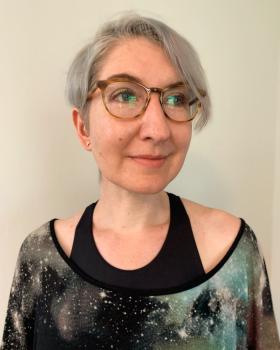Breadcrumb

Physics, B.S. | Class of
Charlotte Olsen
Ph.D. Candidate
Employer: Rutgers, The State University of New Jersey
Job description: I'm a researcher studying galaxy evolution by way of how galaxies form their stellar mass. I work with data from telescopes such as Hubble Space Telescope (HST), GALEX, Sloan Foundation 2.5m Telescope at Apache Point Observatory, and many others. My work requires a solid foundation in physics, mathematics, and computer science in order to analyze these data. I am a member of the Dark Energy Science Collaboration (DESC) for the upcoming Legacy Survey of Space and Time (LSST) from the Vera Rubin Observatory. In addition to this, I sit on both student and faculty committees, as well as doing outreach in local New Brunswick, New Jersey schools.
About Charlotte
Why did you choose this program?
Physics was the most interesting thing I could think to do. I've always been fascinated by how the universe works, and loved the stars as a child. People led me to believe that physics would be inaccessible to me and that I couldn't possibly have the mathematical skills to be successful. They were wrong. The HSU Physics Department offered me access to professors who were genuinely invested in my future. My hard work was acknowledged and my ambitions were encouraged. This is not a research-centered department, and the benefit of this is they care deeply about teaching.
How did this program prepare you for your job?
I had a strong physics foundation upon entering into grad school where I studied alongside students from a wide range of undergraduate institutions. I felt confident that I could keep up with my colleagues from prestigious ivies, but also confident that my knowledge would inform my research. The collegial and welcoming environment within the department gave me the skills to pursue leadership roles in graduate school and the confidence to interact in scientific collaborations.
What did you enjoy most about the program?
This program is not meant to weed you out. If you want to learn then the professors want to teach you. In upper division classes, many learning metrics were centered on practical applications of physics such as final projects in place of an exam. This requires a much greater time commitment from the student, but also has a greater payoff as the more diverse set of problem-solving skills required for this translates well both to academia and industry. Courses were challenging, but fun! My cohort was tight-knit and inclusive.
What would you say to prospective students who are thinking about applying to this program?
Physics is amazing. Why not learn the language of the universe? HSU Physics can be your Duolingo.





